Surprise for Linguists: Nouns and Verbs Sound Different

Linguists have long believed that the sound of a word reveals nothing about its meaning, with a few exceptions of words like “buzz” or “beep” that are known as onomatopoeia.
But a new study analyzing the sounds of nouns and verbs challenges that view.
“What we have shown is that the sound of a word can tell us something about how it is used,” said Morten Christiansen, associate professor of psychology at Cornell University. “Specifically, it tells us whether the word is used as a noun or as a verb, and this relationship affects how we process such words.”
However, if you are mouthing a whole bunch of nouns or verbs and listening for a similar sound in each group, you're out of luck.
"It's not a particular sound," Christiansen said. "It's much more subtle than that."
Christiansen, Thomas Farmer, a Cornell psychology graduate student, and Padraic Monaghan, lecturer at the University of York in the U.K., detailed their findings in the Aug. 8 print issue of the Proceedings of the National Academy of Sciences.
Graphing words
Get the world’s most fascinating discoveries delivered straight to your inbox.
The researchers took the sounds of more than 3,000 words in English and subdivided each by its phonetic features—what a person does with their mouth to produce the sounds of each word.
"We could then represent each word in a multidimensional space," Christiansen told LiveScience. This multidimensional space is similar to a simple coordinate-system graph. It gave researchers a chance to see where each noun and verb falls relative to another.
"Each word is a point in this sound-based, or phonological, space," Christiansen explained. And the distance between the words could be calculated.
The nouns were closer to other nouns, and the verbs were closer to other verbs. About 65 percent of all nouns have another noun as its nearest neighbor and about the same percentage of all verbs have another verb next door, Christiansen said. [See the graph]
Hearing sounds
To demonstrate that people were sensitive to this fact, the researchers timed volunteers while they read words of a sentence, appearing one at a time on a computer screen.
They measured how long it took to read each word. The researchers found that volunteers had an easier time processing verbs that sound more like the typical sounding verbs, such as "amuse." The same went for nouns that were more "nouny," like the word "marble."
The volunteers used the relationship between how words sound and how they are used to guide their comprehension of sentences.
"This affects how you interpret a sentence, something that can help you in reading and practicing faster," Christiansen said. This information can also be used in language acquisition.
The researchers performed the analysis for the English language only, but suspect that there are cues in words of other languages as well.
LiveScience's Robert Roy Britt contributed to this article.
- Linguist Deciphers Uses of Word 'Dude'
- Word Play: Explore Your Inner Etymologist
- Study: Instant Messaging is Surprisingly Formal :-)
- Chomsky Challenge: Bird Said to Grasp Key Aspect of Human Language
- Language of Prairie Dogs Includes Words for Humans
- New Language Has Surprising Structure
- Chinese, English Speakers Vary at Math



